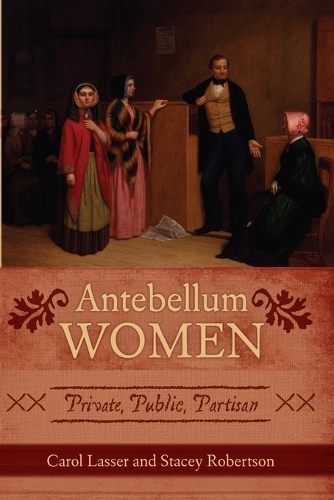
Antebellum Women: Private, Public, Partisan
(Paperback)
Publishing Details
Antebellum Women: Private, Public, Partisan
By (Author) Carol Lasser
By (author) Stacey Robertson
Bloomsbury Publishing PLC
Rowman & Littlefield Publishers
29th March 2013
United States
Classifications
General
Non Fiction
History of the Americas
Gender studies: women and girls
305.4097309034
Physical Properties
Paperback
238
Width 143mm, Height 221mm, Spine 15mm
340g
Description
How did diverse women in America understand, explain, and act upon their varied constraints, positions, responsibilities, and worldviews in changing American society between the end of the Revolution and the beginning of the Civil War Antebellum Women: Private, Public, Partisan answers the question by going beyond previous works in the field. The authors identify three phases in the changing relationship of women to civic and political activities. They first situate women as "deferential domestics" in a world of conservative gender expectations; then map out the development of an ideology that allowed women to leverage their familial responsibilities into participation as "companionate co-workers" in movements of religion, reform, and social welfare; and finally trace the path of those who followed their causes into the world of politics as "passionate partisans." The book includes a selection of primary documents that encompasses both well-known works and previously unpublished texts from a variety of genres, making Antebellum Women a unique one-volume work that will introduce readers to the documentary record as well as to the vibrant body of historical work on gender in the early nineteenth century.
Reviews
Combining lucid analysis of women, black and white, Native and Euro American, elite and laboring classes, with a dazzling variety of documents, Lasser and Robertson freshly synthesize decades of scholarship and introduce us to women's experiences in all their richness and vibrancy. We learn how women's civic identity and impassioned participation changed the face of antebellum America's society and politics. We find in the documents women playing multiple rolesCherokees filing petitions to resist cessions of land, Lowell Mill girls laboring in factories, elite Blacks and Whites organizing benevolent societies, activists calling for the end of slavery, suffragists claiming the vote. Bravo for splendid presentation of women's kaleidoscopic lives. -- Mary Kelley, University of Michigan
Carol Lasser and Stacey Robertson have compiled a superb work that will challenge readers' conventional understanding of American women's involvement in politics in the decades before the Civil War. The wide range of primary sources allows women from a variety of social classes and races to express their political opinions in their own words. Lasser's and Robertson's excellent introduction provides readers with a compelling framework for understanding the changes and continuities in women's political role throughout the first half of the nineteenth century. -- Rosemarie Zagarri, George Mason University
Author Bio
Carol Lasser is professor of history at Oberlin College. Stacey Robertson is Oglesby Professor of American Heritage, chair of the History Department, and director of the Women's Studies Program at Bradley University, where she has been teaching since 1994.
